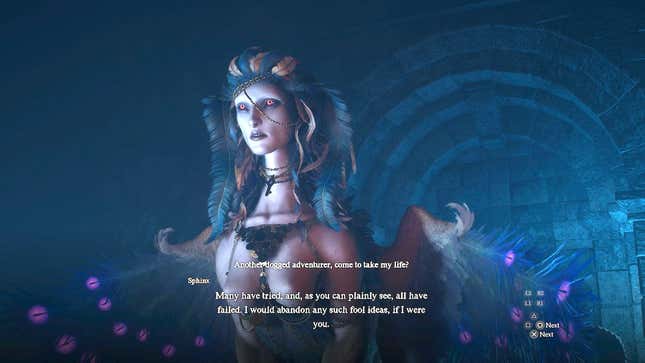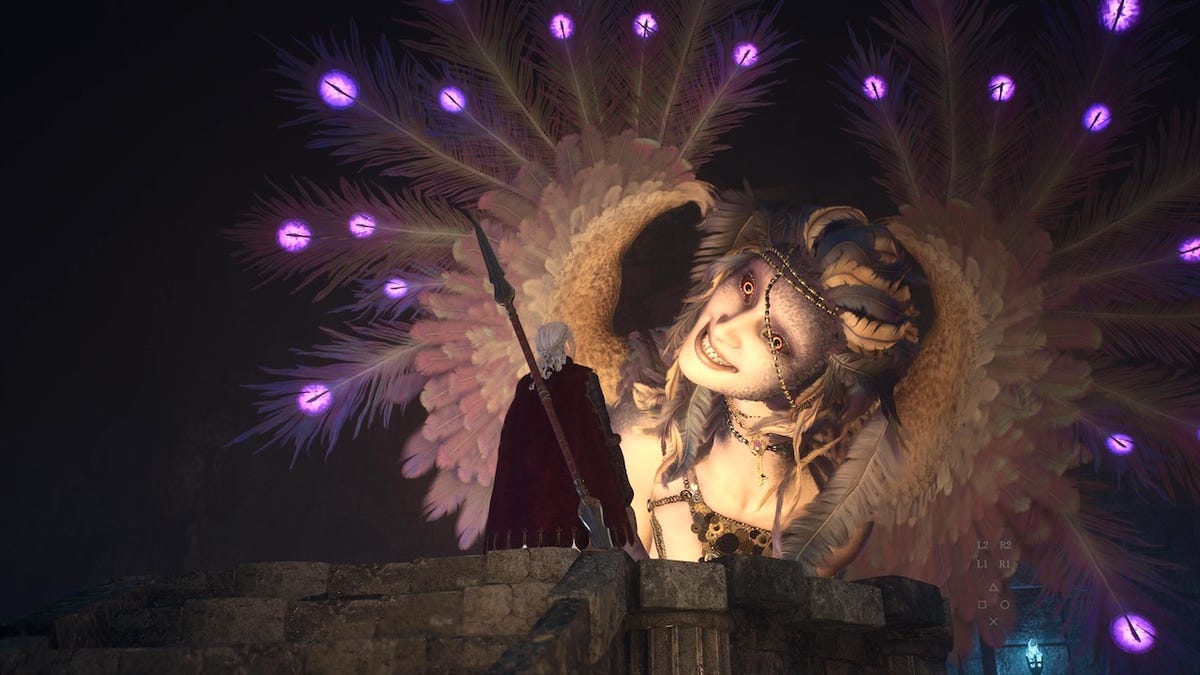Off the beaten path of Dragon’s Dogma 2, away from the safety of the roads, lies a creature unlike anything else the game has to offer. The Sphinx is a unique beast in that she doesn’t challenge the player through combat; rather, she challenges you in a game of wits. It’s a series of riddles that test your knowledge of the game and encapsulate Dragon’s Dogma 2’s design, both its successes and its frustrations. I can’t help but love it.
What An ESRB Rating Means For Hollow Knight: Silksong
Order Dragon’s Dogma 2: Amazon | Best Buy | Humble Bundle
Taking inspiration from the classical Greek version of the mythological creature, the Sphinx in Dragon’s Dogma 2 tasks you with answering confounding riddles. There are five in total that can be tackled in any order, all of which force you to think about a specific system in the game. To talk about why I think these do or don’t work, I’m going to have to spoil the solutions, so if you haven’t met face to face with the creature yourself, then make your way to the mountain shrine north of the Ancient Battleground before reading further.
Three of the riddles the Sphinx challenges you to solve are fairly simple, but reward understanding of the game’s key pillars. The Riddle of Eyes, for instance, can trick you into fighting through a dungeon when you could have completed it within seconds of walking through the entrance. Solving it requires that you pay close attention to your surroundings, something to bear in mind at all times in a game whose world hides worthwhile secrets under every rock.
The Riddle of Madness, meanwhile, reminds you that your Pawns (NPC party members) are your best friends and always there to help you. The Riddle of Conviction, finally, is especially fascinating in how it tests you asking you to sacrifice a rare item with no promise that you will get it back. Having just earned a rare portcrystal from the previous riddle, I put my money where my mouth was and delivered it to the Sphinx. The Sphinx rewarded my conviction, doubling my delivered item and returning it to me. Through this, Dragon’s Dogma 2 reminds you that you need to take risks and be willing to sacrifice, but that your conviction will often be rewarded.

But what I really want to talk about are the remaining two riddles the Sphinx offers, the Riddle of Wisdom and the Riddle of Remembrance. These present the toughest challenge, but one of them succeeds by again rewarding players who have engaged fully with the world and game design of Dragon’s Dogma 2, while the other will make even the most devoted players scratch their heads. The Riddle of Remembrance seems like the most terrifying, as it puts you on the clock. You have seven in-game days to return to the site where you found your first Seeker’s Token. This is a challenge that no guide can help you solve. There are 240 Seeker’s Tokens in the game, and every player will find their first in a different location. The Riddle of Remembrance asks you, “Have you really been paying attention to what you’re doing?” It’s tough but it’s not unfair, and succeeding at the challenge is extremely satisfying.
The Riddle of Wisdom on the other hand, I fucking hate. The Sphinx tells you to find her parent, which is cryptic, but these are riddles after all. The issue is that the solution is incredibly specific and hard to figure out, requiring you to hire a Pawn named “Sphinx Parent” and bring them to the Sphinx. The pawn in question must be summoned from a specific type of Rift, a Rift of Fellowship. There are only a handful of these across the game’s map. And while on the surface it seems like the Riddle of Wisdom is no more complicated or unfair than the rest of the riddles, I don’t think that’s quite true.
Every riddle outside of the Riddle of Wisdom asks you to understand how the game wants you to interact with it. You can give the Sphinx any item or present any pawn for the Riddles of Conviction and Madness, respectively. Even the Riddle of Remembrance asks you to recall something you have definitely done. Solving the Riddle of Wisdom, however, is predicated on you eventually finding a Rift of Fellowship, which requires luck, scouring every corner of the map, or a guide. Even the Sphinx of myth only asked a riddle everybody could answer based solely on life experience! Oedipus didn’t have to explore all of Greece to solve it.
Dragon’s Dogma 2, despite the fact that exploration is where much of the game’s fun happens, isn’t a game that typically forces you to do everything. The Sphinx is a representation of the game’s developers testing you, and most of the time it works and reflects the joyous friction of the game at large. But the Riddle of Wisdom fails to live up to that. It’s only one of five riddles, and represents the small amount of negative friction the game does have, but the experience is jarring nonetheless.
.
